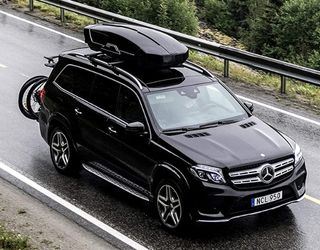If you’re an outdoor enthusiast, a family with children and pets, or a business owner, roof boxes can provide a convenient way to transport belongings on your next trip. But with so many types of roof boxes and brands available, how do you choose the best one for your needs? In this article, we’ll explore the benefits of roof boxes, the types and brands available, installation and maintenance considerations, and other important factors to help you make an informed buying decision.
Benefits of Roof Boxes
Roof boxes offer a number of benefits for those who need to transport items on the roof of their vehicle. Some of these benefits include:
- Increased storage capacity for outdoor gear, luggage, and other items
- Improved weight distribution and aerodynamics for better fuel efficiency
- Secure and weather-resistant storage for your belongings
- Easy installation and removal for convenience
- Versatility for a range of vehicles and purposes
Types of Roof Boxes
Roof boxes come in a variety of sizes, shapes, and materials to fit different vehicles and uses. Some of the most common types of roof boxes include:
Hard Shell Roof Boxes
Hard shell roof boxes are typically made of sturdy materials such as fiberglass, plastic, or metal. They offer superior protection and durability for your belongings, as well as enhanced security features such as locking systems. However, they can be heavier and more difficult to install and remove compared to soft shell options.
Soft Shell Roof Boxes
Soft shell roof boxes are usually made of durable fabrics such as nylon or polyester, with a flexible frame that can be folded or rolled up for storage when not in use. They are generally lighter and easier to install and remove than hard shell options, but may not offer the same level of protection or security.
Roof Box Brands
When it comes to choosing the best brand of roof box for your needs, there are a few key factors to consider. These include the weight limit, aerodynamic design, noise level, mounting system, and compatibility with your vehicle. Some of the top brands of roof boxes on the market include:
Thule
Thule is one of the most well-known brands of roof boxes, offering a wide range of sizes and styles to fit different vehicles and needs. Their roof boxes are known for their sturdy construction, aerodynamic design, and easy installation and removal.
Yakima
Yakima is another popular brand of roof boxes, offering both hard shell and soft shell options in a variety of sizes and colors. Their roof boxes are designed to be easy to mount and remove, with features such as dual-side opening and integrated locks for added security.
SportRack
SportRack is a more budget-friendly option for those looking for a reliable roof box. Their roof boxes are made of durable materials and come in a range of sizes and styles to fit different vehicles and purposes.
Thule vs Yakima vs SportRack
While all three of these brands offer high-quality roof boxes, there are some differences to consider when choosing between them. Thule is generally considered the premium option, with more advanced features and higher price points. Yakima offers a wider range of styles and colors to choose from, while SportRack is a more affordable option without sacrificing durability or functionality.
Installation and Maintenance
Proper installation and maintenance are crucial for ensuring the safety and longevity of your roof box. Before installing your roof box, be sure to measure your vehicle and choose the appropriate size and weight limit for your needs. Follow the manufacturer’s instructions carefully, and use the recommended mounting system to ensure a secure fit.
Regular maintenance such as cleaning and lubrication can help extend the life of your roof box. Check for any signs of wear or damage before and after each use
, and replace any worn or damaged parts as needed. Also, be sure to remove your roof box when not in use to prevent unnecessary wear and tear from exposure to the elements.
Securing Belongings
When packing your roof box, be sure to distribute weight evenly and avoid overloading it beyond the weight limit recommended by the manufacturer. Use packing tips such as filling empty spaces with soft items or placing heavier items at the bottom to prevent shifting during transport. Additionally, use straps or other securing methods to keep your belongings in place and prevent damage or loss during transit.
Roof Box vs Rack vs Trailer
While roof boxes offer a convenient and versatile option for transporting belongings on the roof of your vehicle, there are other options to consider as well. Roof racks can provide a similar level of storage capacity and ease of installation, but may not offer the same level of protection or weather-resistance. Trailers can also provide ample storage space, but may require additional equipment and maintenance.
Legality and Restrictions
Before purchasing and installing a roof box, be sure to research any legality or restriction considerations in your area. Some states or countries may have specific regulations regarding the size, weight, or placement of roof boxes on vehicles.
Environmental Impact and Mitigation
While roof boxes can offer a convenient way to transport belongings on your next adventure, they can also have an impact on the environment. Consider choosing a roof box made of environmentally-friendly materials, and take steps to reduce your carbon footprint by packing efficiently and reducing unnecessary weight.
Conclusion
Roof boxes can provide a convenient and secure way to transport belongings on the roof of your vehicle, whether you’re an outdoor enthusiast, a family with children and pets, or a business owner. With a variety of types, brands, and installation considerations to choose from, it’s important to do your research and choose the best option for your needs. By considering factors such as weight limit, aerodynamic design, and compatibility with your vehicle, you can make an informed buying decision and enjoy the benefits of a high-quality roof box for years to come.
Frequently Asked Questions
Can I use a roof box on any type of vehicle?
Roof boxes can typically be used on most types of vehicles with roof racks or crossbars installed. Be sure to check the compatibility with your specific vehicle before purchasing.
How do I measure my vehicle for a roof box?
To determine the appropriate size and weight limit for your roof box, measure the width and length of your roof, as well as the distance between your roof racks or crossbars.
Can I leave my roof box on my vehicle when it’s not in use?
It’s generally recommended to remove your roof box when not in use to prevent unnecessary wear and tear from exposure to the elements.
Are roof boxes waterproof?
While many roof boxes are designed to be weather-resistant, it’s still recommended to take precautions such as packing items in waterproof bags or containers to prevent water damage.
How do I choose the right mounting system for my roof box?
Consult the manufacturer’s instructions or speak with a professional installer to determine the best mounting system for your vehicle and roof box.






